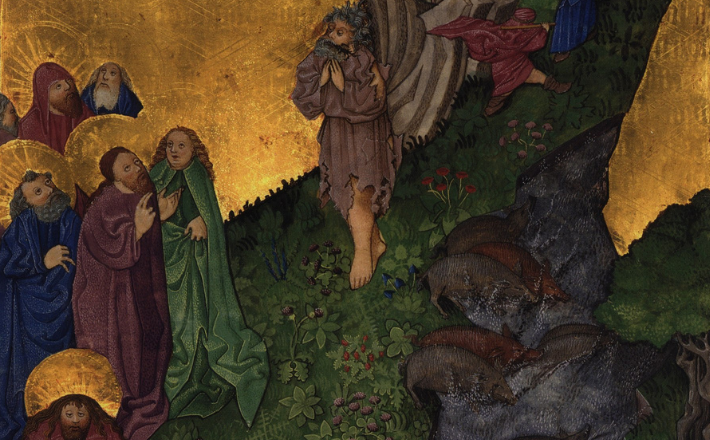Commentary on 1 Kings 19:1-4 [5-7] 8-15a
Considered part of the Historical Books of the Christian Old Testament, the book of 1 Kings includes the chronicling of the death of King David, the reign of King Solomon, the construction and dedication of the temple, the death of Solomon, the ascension of King Jeroboam, the national transition from a united kingdom to a divided kingdom, and the reigns of King Nadab, King Zimri, King Omri, and King Ahab in the northern kingdom of Israel. This book also includes the ministry of one of Israel’s early prophets, Elijah. As a prelude to our focal passage, in 1 Kings 18, the word of the Lord comes to Elijah, instructing him to go to King Ahab during a drought (18:1).
Before readers encounter Elijah in 1 Kings 19, we learn of his confrontation with King Ahab and the prophets of Baal on Mount Carmel in 1 Kings 18. Here, Elijah demonstrates the power and sovereignty of God when he challenges the prophets of Baal to call upon their god to consume a bull offering with fire. When the prophets’ bull is not consumed, Elijah elaborately crafts a wood and stone altar that includes a trench around the edifice, places his bull on the altar, douses his bull with so much water that it pools in the trench, and calls on the name of the Lord. In response, the fire of the Lord falls on and consumes the bull, the wood, the stones, and even the water in the trench (1 Kings 18:38).
When Ahab reports the defeat of the prophets of Baal and Elijah’s slaughter of all the prophets with the sword to his wife, Jezebel, she vows to kill Elijah (1 Kings 19:2). Jezebel sends a messenger to him, saying, “So may the gods do to me, and more also, if I do not make your life like the life of one of them by this time tomorrow.” In the first part of our focal text, Elijah leaves his companion and flees into the wilderness. While alone under a tree, Elijah begs God, “It is enough; now, O LORD, take away my life” (1 Kings 19:4).
After being divinely nourished on his journey to Mount Horeb, Elijah spends the night in a cave (1 Kings 19:9), and in the second portion of our focal text, the word of the Lord tells Elijah to stand on the mountain before the Lord because the Lord is about to pass by. And the passing-by of the Lord is something to experience! Elijah encounters great wind, an earthquake, a fire, and silence, but not the Lord. Finally, Elijah hears a question: “What are you doing here, Elijah?”
Elijah experiences the Lord not in a response to his question but in the form of a new question. Whereas Job is humbled and repents after the Divine responds to his question (Job 38:1–42:6), Elijah complains that, despite being zealous in his commitment to his ministerial assignment, he is now eluding those who seek to kill him. The passage ends with the Lord directing Elijah to return to Damascus to anoint Hazael and Jehu as kings of Aram and Israel, respectively, and Elisha as his prophetic successor.
Commentary
We can learn at least three lessons from Elijah’s experience in 1 Kings 19. The first is that when the Lord is about to pass by, the Lord is already on the move. What does this mean? At the beginning of the canon, the biblical writers give readers their first glimpse of the Divine in action. Aside from the Divine speaking things into being, the writers illustrate the physicality of the Divine in action. The writers’ anthropomorphic depiction of the Divine includes the Divine separating light from darkness (Genesis 1:4), crafting a dome for the waters (1:7, 16), placing lights in the sky to illuminate the earth (1:17), making the animals (1:25), and shaping humankind (1:27). In the second account of creation, the Divine forms humanity from the dust of the ground and breathes life such that the humanoid becomes a living being (2:7).
Modern readers do well to remember that God is a God of movement. In the same way the Divine moved to separate things at creation, God can create distance between you and the things that might cause you harm. In the same way the Divine took action to craft new things, God can build opportunities for you. In the same way the Divine moved to place things in order, God can arrange circumstances on your behalf. Although you may not see evidence of it yet, God is on the move and moving in your direction.
Modern readers should also be aware that when the Lord is about to pass by, there may be chaos. The inconvenient truth of Elijah’s story is that chaos sometimes precedes our encounter with the Divine. Moreover, there may be a direct correlation between our level of desperation and the degree of chaos and confusion. Chaos presents itself in some of the most bewildering ways when we are in “life and death” circumstances and need the Divine to “come and see about us.”
I am reminded of the spiritual “Kum Ba Yah,” in which the psalmist entreats the Lord to “come by here” because they or somebody they know needs divine intervention. In modern times, this song is sung by young and old alike across the globe as part of various gatherings. Although the origin of the spiritual is unknown, many understand it to have been sung by enslaved Africans who lived under the hand of American chattel slavery and entreated the Divine to protect them in the face of oppression. Like when the biblical Elijah faced dire straits, our circumstances may be chaotic, confusing, or unpredictable; we might need the Divine to kum ba yah.
Our kum ba yah cry may be when there is chaos in our finances. Some of us may need the Lord to kum ba yah when we are overwhelmed by circumstances at work. And for some of us, our kum ba yah may be the “parade of power” we need as we watch others suffer injustice. We need the Lord to comfort us when we are low. But the very fact that these kum ba yah circumstances are present in our lives may indicate that the Lord is in fact about to pass by.
Finally, at the end of our passage, the Lord gives Elijah a new assignment. The biblical writer records that after speaking with Elijah, the Lord says, “Go, return on your way to the wilderness of Damascus; when you arrive, you shall anoint Hazael as king over Aram” (1 Kings 19:15). As modern-day believers, we should be prepared—after we have been nourished, have rested, and have encountered the Divine—for a new assignment. We should not be the same after the encounter. We should be emboldened to take on the next God-sized assignment.
The Lord is about to pass by. First Kings 19 reminds us that our God is active and in motion. This passage encourages modern readers to withstand the chaos in our lives. If we understand some harsh experiences as the opening acts of the Divine’s mainstage performance in our lives, we might take a different position when we encounter chaos and confusion. Finally, this passage offers the reader inspiration that chaos in our lives may be the preamble for our next God-sized assignment.


June 22, 2025